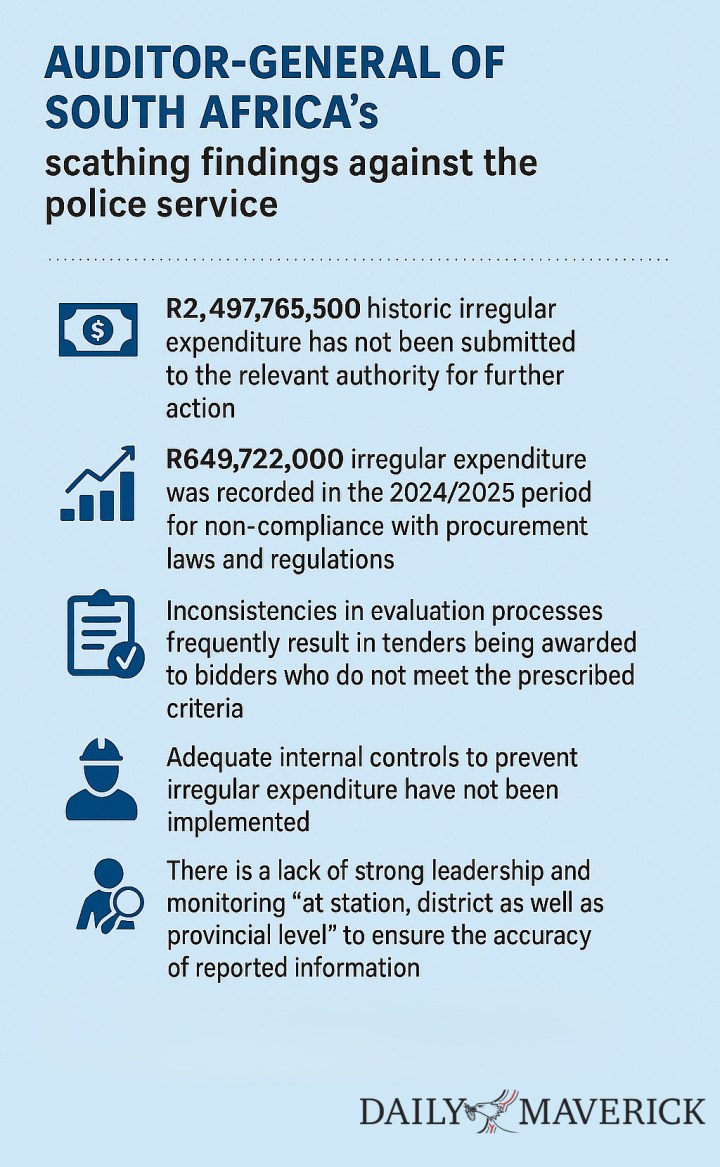
South Africa’s Auditor-General has found that irregular expenditure in the police service has escalated, while R2.5bn previously red-flagged in this arena is yet to be fully dealt with. Meanwhile, there has been ‘persistent non-compliance’ with supply chain management laws.
Police tenders are frequently awarded to bidders who do not meet the prescribed criteria.
This is according to an Auditor-General (AG) of South Africa budgetary review and recommendations report that was discussed during a police committee meeting in Parliament on Monday, 3 November 2025.
Some of the country’s most senior police leaders attended the meeting, which stretched from morning to evening.
Various presentations were shown during the proceedings, including the police’s annual report, which highlighted matters including how officers were making inroads in certain crime arenas.
For example, 18,869 arrests were carried out in connection with illegal mining that posed a major threat and involved thousands of mine workers, mainly from neighbouring countries.
In terms of police-owned firearms, 572 were reported as lost or stolen in the 2024/25 financial year, which was nearly a 23% decrease from the previous period.
These figures, though, did not distract from the Auditor-General’s scathing report.
It deals with the Independent Police Investigative Directorate, the Civilian Secretariat for Police Service, the Private Security Industry Regulatory Authority and the South African Police Service (SAPS).
Most of the focus during Monday’s meeting was on the SAPS.
The report found there was “slow progress in terms of dealing with historic irregular expenditure”.
This is where the SAPS stands out with the highest amount recorded.
R3.2bn irregular expenditure total
According to the Auditor-General’s report, “investigated irregular expenditure not submitted to [the] relevant authority for further action” amounted to R2,497,765, 500 – in other words, just under R2.5-billion.
It was not clear which period the R2.5-billion figure was related to.
In the 2024/25 financial year, irregular expenditure relating to the police amounted to R649,722,000.
The report also said: “[The] SAPS has disclosed R56-million as irregular expenditure under assessment…
“The assessment process is currently underway to determine the nature and extent of the incidents that led to these transgressions.”
If all three irregular expenditure figures (the historic figure, plus the 2024/25 amount and the millions under assessment) attached to the police service are added, this totals about R3.2-billion.
Today the Portfolio Committee on Police received the Auditor General’s reports on the 2024/25 audit outcomes for SAPS, PSiRA, IPID and the Civilian Secretariat.
The findings reveal deep and continuing weaknesses in financial management, procurement integrity and consequence… pic.twitter.com/oDT1Mh9ZwY
— Ian Cameron (@IanCameron23) November 3, 2025
These figures, along with several other highly concerning problems, now add to the controversies already rocking the police service.
A few months ago, in July, an unprecedented scandal started developing when KwaZulu-Natal’s Police Commissioner Nhlanhla Mkhwanazi alleged that a drug trafficking cartel infiltrated South Africa’s law enforcement, politics and private security.
He had also alleged that various individuals, including police minister at the time Senzo Mchunu, had ties to organised crime accused Vusimuzi “Cat” Matlala, who was awarded a R360-million SAPS health services contract in 2024.
Read more: The company they keep — Cele and Mchunu on Matlala, Mogotsi and a murdered convict
This contract was subsequently cancelled.
The Madlanga Commission of Inquiry and a parallel parliamentary ad hoc committee are investigating Mkhwanazi’s accusations.
This scandal has had a reverberating impact, even causing a delay in the release of the police’s official quarterly crime statistics.
‘Growing irregular expenditure’
The Auditor-General’s report, focused on during Monday’s proceedings in Parliament, provided more insight into what the police service is dealing with.
It said: “[The] SAPS has experienced stagnant audit outcomes over the past five years.”
This emphasised that accountability mechanisms needed to be strengthened.
Another critical section of the Auditor-General report says: “The SAPS has shown persistent non-compliance with supply chain management (SCM) laws and regulations.
“This includes irregularities in the procurement of goods and services, which have contributed to a growing trend of irregular expenditure.
“Despite repeated findings and recommendations, the department has not implemented sufficient corrective measures, leading to continued non-compliance in SCM.”
MPs repeatedly focused on this aspect, sometimes referencing Matlala, during Monday’s proceedings.
The Auditor-General report said that after each audit cycle, action plans were developed to address problems.
Read more: Irregular expenditure in police soars by 350%, Parliament hears
“However, the implementation of these plans has not yielded the desired outcomes, as evidenced by the continued escalation in irregular expenditure,” it stated with specific reference to the SAPS.
Reasons underpinning this problem included that bid evaluation committees were not exercising proper due diligence when dealing with tenders.
“Our assessments have uncovered significant inconsistencies in the evaluation process, which frequently result in tenders being awarded to bidders who do not meet the prescribed criteria,” said the Auditor-General report.
Some bids were awarded to suppliers who did not meet all evaluation criteria, while bidders who met criteria were sometimes “unfairly disqualified”.
During Monday’s meeting, Rise Mzansi’s Makashule Gana said he was of the view that SAPS infighting was the result of SCM issues.
He said that “the fights” were not “about protecting the people of South Africa”.
Gana added: “At the root of the fights … all these press conferences … have got to do with supply chain.”
He referenced Matlala’s cancelled R360-million SAPS health services contract.
‘Lacking leadership’ and eDocket delays
Meanwhile, according to the Auditor-General report, the SAPS also fell short in terms of reporting and verifying information that indicated how it was performing.
It was found there was “a lack of strong leadership” in ensuring the accuracy of reported information.
Some of this included detective commanders not updating investigation diaries to validate closing leads.
Firearms that were recovered in previous financial years were reported as an achievement in the current year.
In other cases, firearms were reported as recovered but no evidence was included to confirm these had previously been stolen or lost.
“These recurring issues not only undermine the credibility of reported achievements but also compromise the department’s ability to demonstrate effective and accountable service delivery,” said the Auditor-General report.
Read more: Rolling out of SAPS’s e-docket system to replace archaic ‘brown donkeys’ drags on
In terms of service delivery, an Investigation Case Docket Management System, otherwise known as an eDocket system, went active nearly a decade ago in 2015.
Daily Maverick sourced a government press release from two years later (2017) that said: “[The] SAPS envisages that within the next five years, corruption in police investigations and the theft of case dockets will become almost impossible, as the eDocket system will be fully operational in all police stations.”
This prediction was inaccurate.
The Auditor-General report, discussed during Monday’s police committee meeting, said that the eDocket system had been deployed to 1,050 of the country’s 1,166 police stations.
Read more: SAPS ballistics backlog imperils criminal cases and undermines trust in police
This meant 115 police stations still did not have it.
Some stations needed a network upgrade for the system to be implemented.
“The incomplete rollout limits the ability to scan and manage electronic case dockets, undermining the system’s intended benefits,” said the Auditor-General report.
ActionSA’s Dereleen James believed the situation on the ground, in terms of police stations and scanners, was worse than what was recorded in the report.
“We talk about scanning dockets to linking it to the police system … scanners are outdated or are not working,” she said.
Forensic analysis
The Forensic Science Laboratory was also flagged.
According to the Auditor-General report, between the 2021/22 and 2024/25 financial years, the number of case exhibits being received there increased by an average of 14%.
There had also been a 60% increase in backlog cases between the 2023/24 and 2024/25 financial years.
“Despite this growth, staffing levels have not increased proportionately,” said the report.
“As a result, forensic analysts are unable to complete the examination of exhibits within the prescribed 113-day timeframe, as outlined in the technical indicator description of the 2024/25 annual performance plan.
“This human resource capacity constraint poses a significant risk to the department’s ability to fully execute and achieve its constitutional mandate.”
There had been some improvements though.
In May last year, 75 posts were approved for filling and, by the end of March this year, 6o of those had been filled.
‘Darkness’ versus ‘reset’
During Monday’s meeting, National Police Commissioner Fannie Masemola was present.
He spoke about resources, including how 4,000 detectives were being trained and how the police’s vehicle fleet was “getting old”.
Replacement vehicles were therefore being brought in.
Masemola said in terms of irregular expenditure, consequence management was going to be applied.
He was of the view that the turbulence in the police service had to do with investigations.
Read more: Mchunu ‘unlawfully’ usurped Masemola’s power in political killings saga, Madlanga Commission hears
Acting Police Minister Firoz Cachalia was also present at Monday’s meeting.
He said the questions MPs were asking during the proceedings, along with what was happening at the Madlanga Commission and the parliamentary ad hoc committee hearings, were speaking to “the moment that the SAPS is in and that the country is in”.
He said that while the Madlanga Commission and the Auditor-General’s report were focusing “on the darkness”, what was emerging about the police service was also providing “an opportunity to reset”.
Cachalia said the Auditor-General’s report, which raised issues about irregular expenditure, showed that the response to the previous audit outcomes “was not adequate”.
Focusing on this was among his priorities.
Cachalia is set to be a witness at Parliament’s ad hoc committee later this week.
The Madlanga Commission also continues and is exposing even more policing controversies. DM
.




